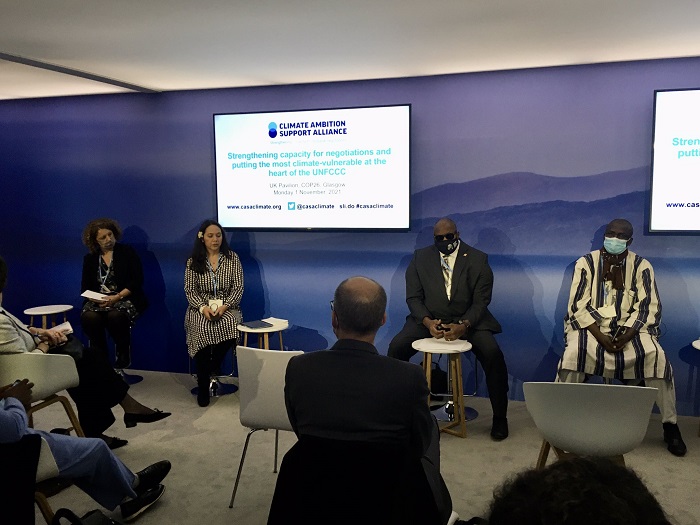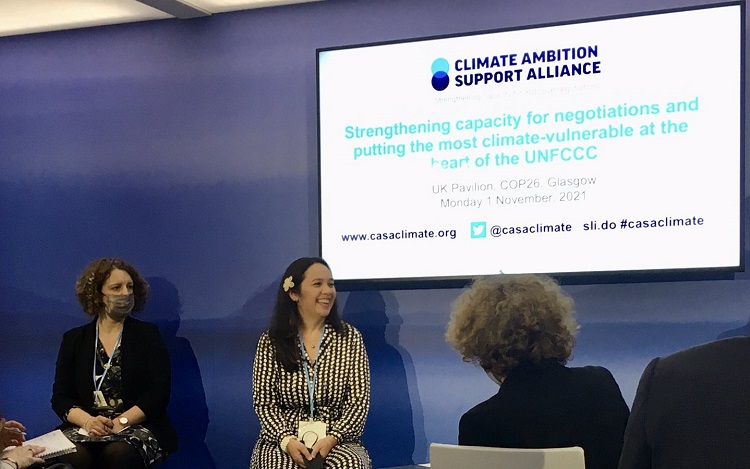SIDS and LDCs: Further capacity-building will be vital to level the playing field for climate diplomacy

Small Island Developing States and Least Developed Countries still face significant inequalities when it comes to representing their interests in the UNFCCC negotiations – compared to bigger, better resourced countries. It is likely they will benefit from logistical, technical and legal support to for some time to come.
That’s according to leading spokespeople from the Alliance of Small Island States and Least Developed Countries Group at a specially-convened CASA event at COP26 last night, chaired by Dean Bialek of the COP26 Champions Team.
Ambassador Aubrey Webson of Antigua and Barbuda, the Chair of AOSIS, said that small island negotiators face ‘high levels of stress’. They are ‘exhausted’ by trying to follow and influence multiple, complex, technical strands of the climate change negotiations.
AOSIS, the LDC Group and High Ambition Coalition have all received logistical support and independent, non-partisan technical and legal advice from partners of the CASA alliance over the past eight years (and from its predecessor, the negotiations support programme of CDKN – the Climate and Development Knowledge Network).
Benefits of support to SIDS and LDCs
One of the foremost benefits of this support has been to “allow us to coordinate, to organise,” Ambassador Webson said.
“It is so important that we coordinate and work together as AOSIS. If we work together it helps us overcome the issues of small size, limited numbers and remoteness. Coming together and coordinating under the AOSIS banner gives us a bit of a chance” to be heard and marshal support.
Changing goal posts
Within their negotiating groups and governments, SIDS and LDC climate experts try to build institutional capacity for climate diplomacy.
But the reality is that they deal with changing goal posts in the UNFCCC talks and international processes
“Every six months, there are new concepts, new jargon,” noted Mamadou Honadia of Burkina Faso, a Special Advisor to the LDC Chair.
“First it was NAPAs, now it’s NAPs” he said, refering to the National Adaptation Programmes of Action that LDCs prepared for submission to the UNFCCC some 10-15 years ago, and a new incarnation, the National Adaptation Plans.

Many international fora
It has also become necessary for governments to track the integration of climate issues across numerous development finance processes and international policy fora.
SIDS and LDCs cannot leave climate ambition to chance – they are determined to hold all sectors accountable to action for a 1.5C temperature pathway. There’s too much at stake if the world exceeds this threshold.
Pursuing climate diplomacy, then, is “not only happening at the UNFCCC, but at places like the World Bank Spring and Fall meetings,” Ambassador Webson noted.
“[Engaging effectively in] all of these requires particular skills and resources. Sometimes that stretches island beyond what we can get a true opportunity to address.”
Covid-19 pressure
The Covid-19 pandemic has dealt new challenges to LDC and SIDS delegates.
Some Pacific island delegates did not make it to COP26 in Glasgow. They needed to transit through Australia or New Zealand, but Covid restrictions prevented their doing so, or they were daunted by quarantine rules and expenses.
The move to virtual conferencing (as a result of Covid-19) may appear to have made meetings more inclusive.
However, Tina Stege, Climate Envoy for the Republic of the Marshall Islands, said time zones differences are still a major problem.
“The Pacific never seems to be on the right side of whatever meeting it is,” she said.
It’s just practicalities: if it is a midnight meeting, that may mean that your offices close and you don’t have internet at home.”
Investments to make climate diplomacy more inclusive
Ms Stege said the Marshall Islands tries to work around time zone problems by convening meetings during multiple time slots when possible, to boost inclusivity.
Mr Honadia, from the LDC Group, said he also championed more interpretation and translation, to extend documents and meetings beyond English-speakers.
These practical solutions can all make a material difference to who participates, and how effectively they do so.
The other specific need countries have is training in methodologies, Mr Honadia said. As the Paris Agreement enters its implementation phase and there are new requirements for tracking progress and reporting to the international community via the Enhanced Transparency Framework, countries need capacity building in relevant methodologies.
Securing the evening’s discussion with an important announcement to herald more technical assistance to support these needs, Ms Kate Hughes, Director of International Climate Change of the UK Government announced that her department was committing to further funding for the CASA programme.
The details are still to be announced in full, but this positive news was welcomed by speakers and delegates as a sign of further, productive partnerships to work towards leveling the playing field for the most climate-vulnerable and putting their needs at the heart of the UNFCCC.
Article by Mairi Dupar with extra reporting by Laure Boissat, CASA; Images by Josie Emanuel, CASA.